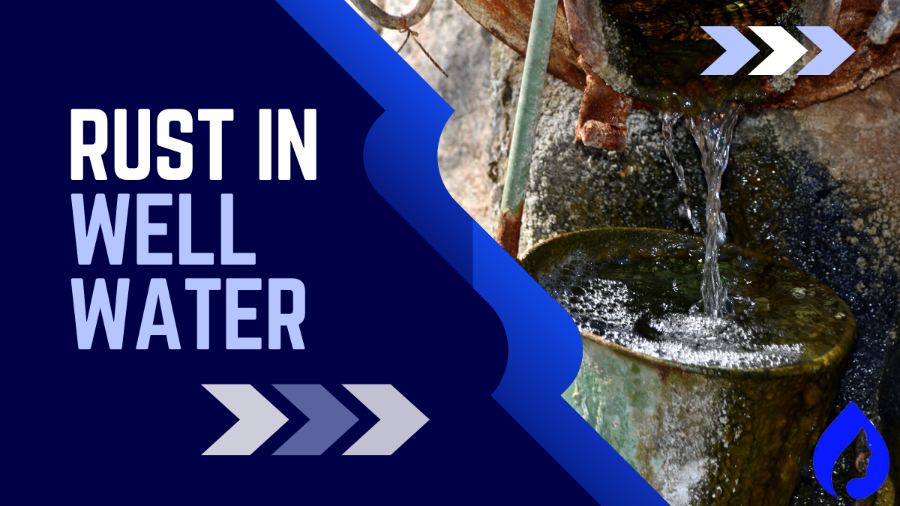
Does your well water taste metallic? Are there brownish and reddish rings or cloudy orange stains on your sinks? Are your clothes turning yellowish after laundry?
It’s because of rust, most likely because of corroded pipes, damaged well casing, excess iron in groundwater, or iron bacteria in well pipes. It’s best to use an iron filtration system (a rust filter) to treat the rust particles caused by excess iron. For damaged well casing, call a well-repair contractor.
Continue reading for practical troubleshooting for rust in well water.
Why Is My Well Water Suddenly Rusty: Causes
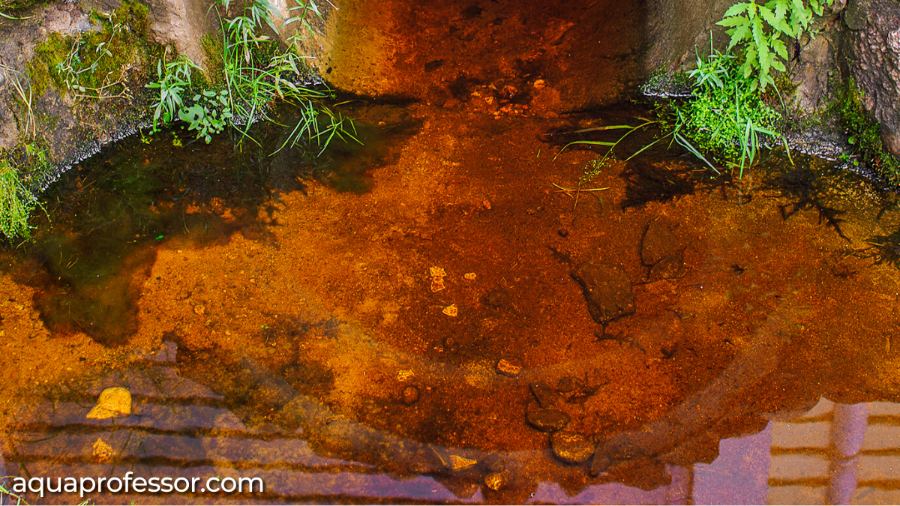
Rust is the reddish-brown coating of iron oxide caused by oxidation of Ferrum in the presence of air or moisture. Although small amounts of rust particles in well water are common, an excessive amount can make water “hard” to drink and use in household chores.
Here are the 3 main reasons for excessive rust:
Corrosion of Metal Pipes or Well Water Plumbing System
It usually happens when well water flowing through the pipe or well water plumbing system is soft and acidic. The acidic water (that results from carbonate rocks in aquifers or polluted rainwater) tends to erode the pipes’ or the plumbing system’s metal and form metal deposits in the form of rust.
Sooner or later, the rust inside the pipes or the well water plumbing system gets leaked, giving an ugly metallic taste to the water supply.
Rusted Well Casing or Damaged Well Caps
Well casing is the tube-shaped sealed pathway through which the water from the aquifer reaches your well. This casing is also helpful in keeping away dirt (or other contaminants) and the groundwater from the well.
Sometimes, a well casing gets leaked due to an earthquake or heavy rainfall and thus fails to prevent contaminants from entering your well water. As a result, you get rusty water.
The damage or leakage in your well caps may, similarly, give rise to rusty water. Again, the broken well cap will permit the water contaminated with chemicals and pathogens from your nearby septic systems to enter your well water system, thus contaminating your water system too.
Bacteria In Wells
Two types of bacteria cause rust and clogging in wells:
The color of slime varies as per the nutrient:
If you inspect the plumbing and see a slimy mass but only a smear, it’s probably in a newer condition. As numbers increase, the slime oxidizes (hardens) and becomes a nutrient for IB. The bacteria fill the hollow tube with slime, and the entwined line becomes the color of the slime.
As more slime formers increase and plugging becomes more severe, the top debris remains slimy, and as you dig into the plugging, it becomes harder and dense.
The water would taste and smell swampy, musty, oily, or sewage-like/rotten vegetation-like. It becomes more apparent if you leave the water unused for several days.
Also Read: 5 Best Iron Filter
Can Rust in Well Water Make You Sick?

EPA has listed rust in well water (caused by iron deposits over 0.3 mg/L) as an aesthetic problem and keeps it as a secondary standard. There are many disturbing effects of rusty water like:
Also Read: How to Use Iron Out In Water Softener
How To Get Rid of Rust in Well Water? [Removal & Prevention]
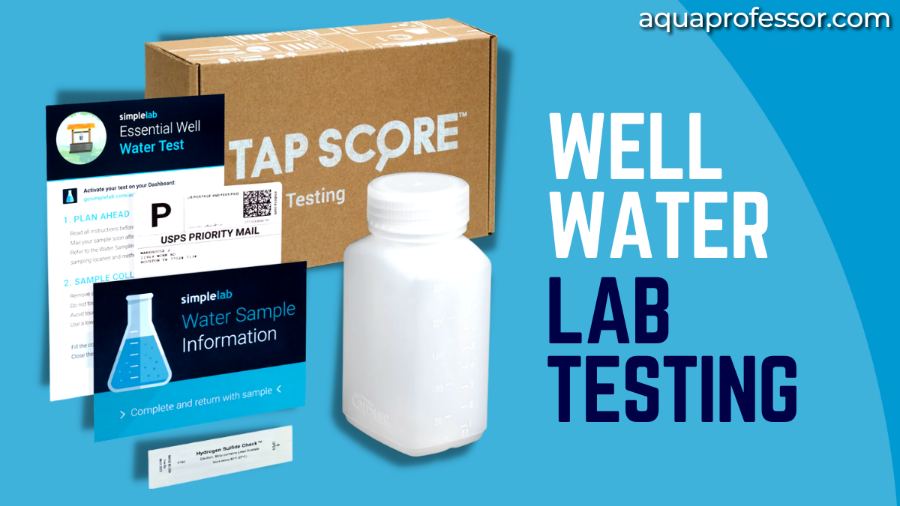
Your first step should be to send your well water for testing. We recommend the Tap Score Essential Well Water Test for evaluating iron and manganese levels in your private well and an extensive list of 50 other contaminants.
After getting the test report within 5 days, if you find the cause of rust to be excess iron deposits in groundwater, follow the following measures to fix it:
Immediate Fix: Use Rust Remover Enhancement for Water Treatment
You can use a rust remover enhancement substance like Rust Out for your water treatment by eliminating all the rust deposits from your well. This iron water treatment process is affordable and takes only two hours to remove iron.
However, you must be cautious not to re-solidify dissolved rust by obeying the instruction manual. It’s best to use this while using a water softener.
Permanent Fix #1: Install a Water Softener

A water softener is a permanent and affordable solution for your well’s hard water treatment, especially for rust buildup. Hard water comprises many magnesium or iron minerals. A salt-based regular water softener replaces the calcium or magnesium ions in the water with sodium ions.
Conclusion:
As a result, the water becomes soft, and the chance of rust buildup in your pipes and plumbing fixtures becomes zero. A water softener works best when the iron levels are 3 ppm or less.
Permanent Fix #2: Invest in Iron Filters for Well Water
A water softener fails to work alone when the iron content in well water is more than 3 ppm. In that situation, an iron or rust filter is the ultimate solution.
This water treatment device effectively filters out all the rust particles from your water and prevents them from entering your existing water system.
The ion exchange resin of the iron filter or rust filter attracts and traps the rust particles from your well water, preventing them from damaging your pipes or fixtures and giving you healthy water fit for drinking.
Permanent Fix #3: Use Hydrogen Peroxide System
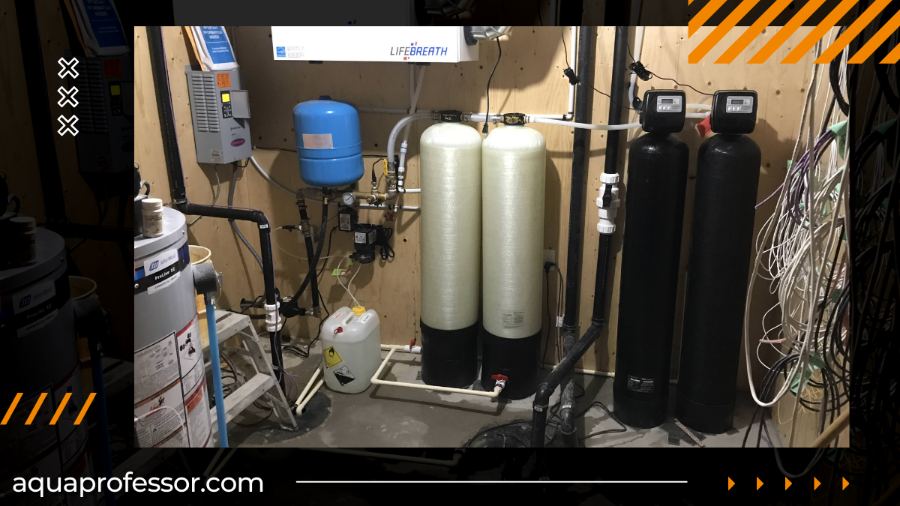
If the water test results show sulfide presence in your well water, a hydrogen peroxide well water system is the best option. It eliminates rust and hydrogen sulfide gas from the well water.
Unlike shock chlorination systems, which work only under a low ph range, Hydrogen sulfide systems work even under a high water pH range.
However, a Hydrogen Peroxide system is quite expensive. If rust is because of corroded metal pipes or a damaged well, these methods come to help:
Replace Metal Pipes With PVC
Rusty well water also occurs if the house pipes or plumbing fixtures are galvanized or made of metal. These metallic / galvanized pipes become susceptible to corrosion after some time, giving rise to rusty water.
Replacing the metallic or galvanized pipes with Poly Vinyl Chloride (PVC) pipes will solve the problem as they will never corrode or generate rust, even if they get old.
Change Damaged Well Cap and Casing
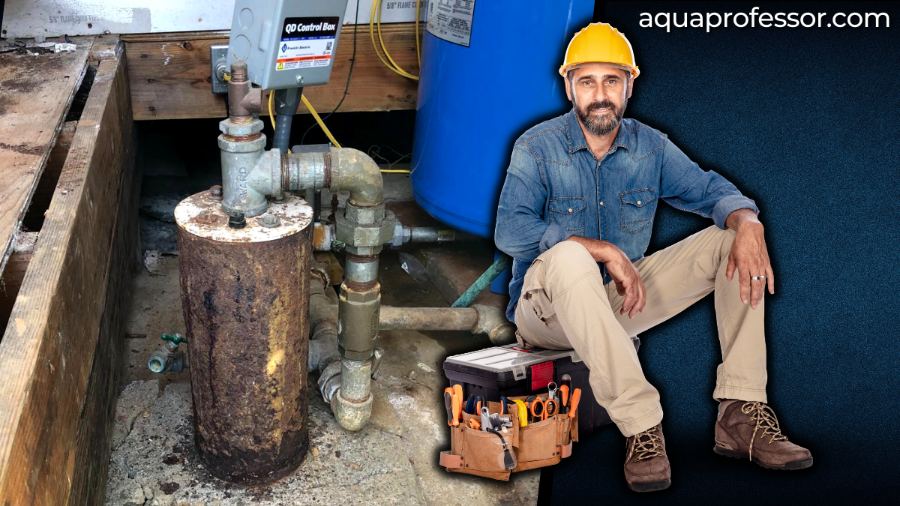
A damaged well cap and casing can dangerously contaminate your well water with heavy metals and pathogens.
If you detect either of these issues, stop drinking water immediately and call the well technician. He will inspect whether there’s any scope for repair or if the entire casing has to be replaced.
Scrub and Clean Well With Professional Help
You should regularly clean your well and scrub away its rust deposits with professional help.
Rust In Well Water FAQs
Is it OK to take a bath in rusty water?
Although drinking rusty water is not safe, it is safe for bathing. Bathing in this water will not expose you to health risks. However, the orangish-brown color of the water and its bitter smell may make you feel yucky.
If you have no choice other than bathing in rusty water, take some precautions:
1. Bath in cold water instead of hot water so that the iron in the rusty water doesn’t infiltrate your skin.
2. Use body washes instead of harsh soap to avoid dryness of your skin.
3. Apply moisturizing cream to your skin to keep it moistened.
Does a water softener remove rust?
Yes, a water softener (especially a salt-based water softening system) is one of the best water treatment methods for eliminating rust from your well water. The water softening machine does its job by replacing the calcium or magnesium ions with sodium ions.
However, normal salt-based water softeners only work if your water’s iron content is less than 3 ppm. You need to install an iron filter for extreme rust-related problems with your well water.
Will bleach get rid of rust in the well?
No, bleach can never help you to get rid of rusty well water. On the contrary, applying bleach to your rusty well or its water may worsen the situation and make the color of the rust (iron) more prominent.
To get rid of rusty water, you may clean away the rust of your well by scrubbing them and spreading rust removal product on it. You may also choose to install a water treatment machine like a water softener or an iron filter at your home.
Can a water heater cause rusty water?
Yes, a water heater may cause rusty water. The rust may either come from the bacterial iron growth in your well water plumbing system or the corrosion of your water heater tank. Sometimes, corrosion of the pipes or the well water plumbing system that connects your water heater to the main water system also results in the flow of rusty water from your geyser.
Does boiling water remove rust?
No, boiling water can never be entrusted for removing iron or rust. It can remove contaminants, like parasites, bacteria, etc., from water. However, rust, a product of a metal’s corrosion (iron/manganese), cannot be removed by boiling.
Adarsh is a Health & Nutrition Sciences graduate with expertise in environmental health. He is associated with ventures like Glacier Fresh Filter and Simpure Filter Systems. Through Aqua Professor, he intends to provide helpful information to every home to help them make smarter decisions.

We do not use our well water in the house. Our house water is a separate system and is fine.
However the watering system outside has rust. What can we do to prevent the rust?
Hey Eleanor, you can use alloy and apply oil and paint to prevent rust.